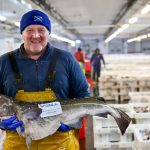Scientists from the Institute of Marine Research use simple technology in the Lysefjord large scale fjord-laboratory to study how supply of nutrient-rich deeper water to the upper water layers increase micro-algae production during the summer season. New results demonstrate how this increase is converted to mussel growth.
– The mussel often need long time to restore after spawning in late spring, and meat content are therefore typically low during summer. By bringing up some of the nutrients stored in the fjord basin water we see large possibilities in developing efficient and sustainable aquaculture, primarily exemplified by production of high quality mussels, says Tore Strohmeier who is one of the researcher working at the fjord laboratory.
By assisting nature to maintain the production of algae during the summer period our results showed that the mussels restore and enhance their meat content within two weeks after spawning. Mussels have no market value after spawning and a fast recover is essential in mussel farming. In general the mussels grown in the area influenced by upwelled deeper water also show higher meat yield than mussels from the outside area. Typically, mussels grown in fjords rarely show high meat content in summer.








